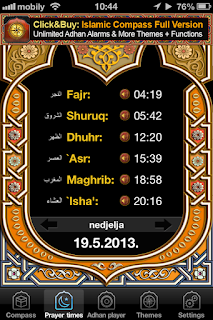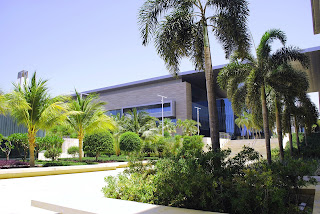..but I found qibla.
as most of you know by now this PhD is giving me grey hair. Some people assure me that this overwhelming sense of directionlessness is normal and that patience and effort will get me through but I was never good in taking advice seriously. So, now I have myokymia advancing to blepharospasm and according to www.zena.hr (www.woman.cro in croatian) twitching in lower left eyelid means that I will "receive bad news"- I certainly hope it won't have *anything* to do with today's local elections in Croatia.
However I upgraded my smartphone with a super application: Islamic Compass Free by Islam Pray Institute for Quran and Qibla.
It gives you day-specific prayer times and qibla, which is the direction you need to face while praying. And it equals the Ka'aba (literally meaning "the cube"), a cuboid building in Mecca. It is the same building that Muslims revolve around when they are performing pilgrimage (Hajj-the big one or Umrah-"smaller" one).
Ka'aba (and the mosque built around it) is one of the holiest sites in Islam, but it should NOT be worshiped!
obviously, the compass is confused, much like its current user, because Mecca is to the south-east of KAUST
There are 5 prayer times which are sun dependent: first one is before sunrise and last two are before and after sunset/twilight. (note that the second one "shuruq" marks the actual sunrise)
In everyday life it looks like this: ca 15 minutes before actual prayers there is a beautiful melodic call for prayer from the mosque which I guess reminds the congregation to flock and pray. I thought it was universal and that all the mosques have equal calls, but it turned out not to be true: you just need to find yourself in area where you can hear more then one imam calling to witness the variety and cacophony of the diversity.
So far, I liked the KAUST call best.
In usual circumstances, i.e. outside KAUST, during prayer times everything stops working, I guess to allow everyone to pray. That means that all the shops kick out their customers and close, however, restaurants are a little more flexible- they only shut their doors and do not allow anyone in or out. So, if you got your food beforehand, you can eat it in peace, but you are not allowed to pay (dealing with money during prayer times is supposedly a sin) and therefore-leave.
I am not sure about other services (does the traffic stop? what about police-do they stop working?) but when I went for the night dive the group waited for the instructors to finish praying before we could go in the sea.
These strict rules do not apply to the campus, but each building at the University is equipped with a praying room allowing every Muslim to nurture their faith. So, if you are surrounded with the infidels and you're not paying attention, other than the call to prayer and a sporadic Muslim in hurry to get to the mosque on time, you couldn't tell the difference.
The last prayer time lasts about 30 minutes, and when we went to Jeddah, we nearly missed the bus back to KAUST because the waiters weren't allowed to let us go.
Conclusion: the app is absolutely essential when not in KAUST and I am quite convinced that the number of expats' smartphones equipped with this app exceed Muslims' by several orders of magnitude.
as most of you know by now this PhD is giving me grey hair. Some people assure me that this overwhelming sense of directionlessness is normal and that patience and effort will get me through but I was never good in taking advice seriously. So, now I have myokymia advancing to blepharospasm and according to www.zena.hr (www.woman.cro in croatian) twitching in lower left eyelid means that I will "receive bad news"- I certainly hope it won't have *anything* to do with today's local elections in Croatia.
However I upgraded my smartphone with a super application: Islamic Compass Free by Islam Pray Institute for Quran and Qibla.
It gives you day-specific prayer times and qibla, which is the direction you need to face while praying. And it equals the Ka'aba (literally meaning "the cube"), a cuboid building in Mecca. It is the same building that Muslims revolve around when they are performing pilgrimage (Hajj-the big one or Umrah-"smaller" one).
Ka'aba (and the mosque built around it) is one of the holiest sites in Islam, but it should NOT be worshiped!
obviously, the compass is confused, much like its current user, because Mecca is to the south-east of KAUST
There are 5 prayer times which are sun dependent: first one is before sunrise and last two are before and after sunset/twilight. (note that the second one "shuruq" marks the actual sunrise)
In everyday life it looks like this: ca 15 minutes before actual prayers there is a beautiful melodic call for prayer from the mosque which I guess reminds the congregation to flock and pray. I thought it was universal and that all the mosques have equal calls, but it turned out not to be true: you just need to find yourself in area where you can hear more then one imam calling to witness the variety and cacophony of the diversity.
So far, I liked the KAUST call best.
In usual circumstances, i.e. outside KAUST, during prayer times everything stops working, I guess to allow everyone to pray. That means that all the shops kick out their customers and close, however, restaurants are a little more flexible- they only shut their doors and do not allow anyone in or out. So, if you got your food beforehand, you can eat it in peace, but you are not allowed to pay (dealing with money during prayer times is supposedly a sin) and therefore-leave.
I am not sure about other services (does the traffic stop? what about police-do they stop working?) but when I went for the night dive the group waited for the instructors to finish praying before we could go in the sea.
These strict rules do not apply to the campus, but each building at the University is equipped with a praying room allowing every Muslim to nurture their faith. So, if you are surrounded with the infidels and you're not paying attention, other than the call to prayer and a sporadic Muslim in hurry to get to the mosque on time, you couldn't tell the difference.
The last prayer time lasts about 30 minutes, and when we went to Jeddah, we nearly missed the bus back to KAUST because the waiters weren't allowed to let us go.
Conclusion: the app is absolutely essential when not in KAUST and I am quite convinced that the number of expats' smartphones equipped with this app exceed Muslims' by several orders of magnitude.
















